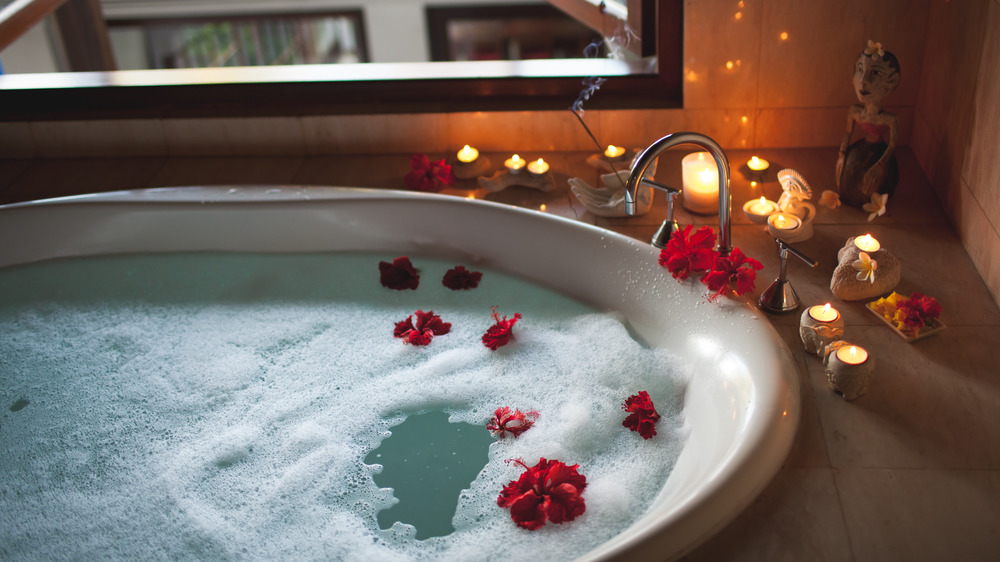Why You Should Think Twice Before Having Sex In The Water
Remember the scene from Seinfeld where Elaine says, in reference to the movie The English Patient, "Sex in a tub — it just doesn't work!" It was a funny line, but can it be true? After all, we've seen many TV shows and movies that depict a couple in a steamy tub surrounded by candles. It's very romantic and tempting to try that in our own sex lives. But besides the difficulty of two people moving vigorously in a hard space with no give, is it even safe to have sex in water? It depends on where the water is.
If the idea of getting intimate in water outdoors — say a pool, hot tub, or natural body of water — sounds exciting, you'll need to consider a few things before you dive in. Lakes and rivers can seem pristine if the water is clear, while the exhilarating rush of water in an ocean is just so tempting for some al fresco fooling around. But such bodies of water can harbor organisms that cause problems, such as parasites and bacteria. You don't want these critters being ushered into the vagina and you definitely don't want to up you risk of yeast infections, urinary tract infections, or bacterial vaginosis, says certified sex coach Gigi Engle (via Cosmopolitan).
Pools may also appear clean with their sparkling, chlorinated blue water, but a report from the Centers for Disease Control and Prevention determined that when a pool's pH levels are not balanced — a common problem — the disinfectants used to kill organisms don't work as well (per Women's Health). The same is true of hot tubs.
How to have safe sex in the water
In addition to the organisms floating around, there's another challenge with underwater sex. The pumping action of intercourse can cause the vagina's natural lubrication to wash away, which can render vaginal tissues more prone to tiny tears and abrasions, Idries Abdur-Rahman, M.D., an OBGYN, told Self. When the tears are met with irritants like chlorine or salt water, it may cause stinging. In addition, micro tears may allow bacteria to infiltrate vaginal tissues. Using a silicone lube, not a water-based one, is your best bet for preventing abrasions when having intercourse underwater.
And there's more discouraging news about submerged sex. Even without tears forming, chlorine can cause a pH imbalance in the vagina, possibly leading to an infection. And keep in mind that pool disinfectants won't prevent you from catching a sexually transmitted infection from your partner. You'll still want to use a condom, with lots of lube so the friction won't cause it to break.
If you're still absolutely intent on having underwater sex, think about bringing the action indoors, to a bathtub or shower, where there's no chlorine or water-borne bacteria. Using lube, however, is still of the utmost importance. Even though there's water all around, not a drop can be used for lubrication so you will still need lube to prevent vaginal dryness.
Your own bathroom is the safest place for water-drenched sex because it's private. While having sex outdoors is wildly tempting, it is, of course, illegal. So prove Elaine wrong and make good use of that bathtub.


